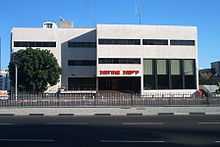Yedioth Ahronoth
| Type | Daily newspaper |
|---|---|
| Format | Tabloid |
| Owner(s) | Yedioth Ahronoth Group |
| Founder(s) | Nachum Kumarov |
| Publisher | Arnon Mozes |
| Editor | Ron Yaron |
| Founded | 1939 |
| Political alignment | Centrism |
| Language | Hebrew |
| Headquarters |
138 Petah Tikva Rd., Tel Aviv 67446, Israel |
| Circulation |
300,000 weekdays 600,000 weekends[1] |
| Official website | www.ynetnews.com |
Yedioth Ahronoth (Hebrew: ידיעות אחרונות, ![]() Yedi'ot Aharonot (help·info), lit. Latest News) is a daily newspaper published in Tel Aviv, Israel. Since the 1930s, it has been the most widely circulated paper in Israel.[2][3] In a TGI survey comparing the last half of 2009 with the same period in 2008, Yedioth Ahronoth retained the title of most widely read newspaper in Israel but saw its market share fall only slightly from 35.9 to 33.9 percent.[4] In July 2010, though a TGI survey of the media reported that Israel HaYom overtook Yedioth Ahronoth as the most read newspaper in terms of exposure with a rate of 35.2% compared with Yedioth's 34.9%. After only a few months of publication of a weekend edition, it scored it 25.7% of exposure compared with Yedioth's 43.7% rate.[5]
Yedi'ot Aharonot (help·info), lit. Latest News) is a daily newspaper published in Tel Aviv, Israel. Since the 1930s, it has been the most widely circulated paper in Israel.[2][3] In a TGI survey comparing the last half of 2009 with the same period in 2008, Yedioth Ahronoth retained the title of most widely read newspaper in Israel but saw its market share fall only slightly from 35.9 to 33.9 percent.[4] In July 2010, though a TGI survey of the media reported that Israel HaYom overtook Yedioth Ahronoth as the most read newspaper in terms of exposure with a rate of 35.2% compared with Yedioth's 34.9%. After only a few months of publication of a weekend edition, it scored it 25.7% of exposure compared with Yedioth's 43.7% rate.[5]
Early history
Yedioth Ahronoth was established in the late 1930s by an investor named Nachum Kumarov. It was the first evening paper in the British Mandate of Palestine, and attempted to emulate the format of the London Evening Standard. Running into financial difficulties, Kumarov sold the paper to Yehuda Mozes, a wealthy land dealer who regarded the paper as an interesting hobby and a long-term financial investment. His sons, Reuben and Noah ran the paper with Noah as the first managing editor.[3]
In 1948, a large group of journalists and staff members led by Ezriel Carlebach, who was editor at the time, left to form Yedioth Maariv, later known as Maariv. Carlebach was replaced by Herzl Rosenblum. This began an on-going battle for circulation and prestige between the rival newspapers, which peaked during the 1990s when both papers were discovered to have bugged one another's phones.[6][7]
Today

Today, the paper is headed by Noah Mozes's son, Arnon Mozes. For many years it was edited by Herzl Rosenblum's son, Moshe Vardi, who was replaced in 2005 by Rafi Ginat. It is published in tabloid format, and according to one author, its marketing strategy emphasizes "drama and human interest over sophisticated analysis."[8] It has been described as "undoubtedly the country's number-one paper."[3] The paper is open to a wide range of political views.[2]
It is owned by the Yedioth Ahronoth Group,[9] which also owns stocks in several Israeli companies, such as "Channel 2", a commercial television channel; "Hot", the Cable TV company; "Yedioth Tikshoret", a group of weekly local newspapers; Vesti, a Russian language newspaper; magazines, such as the weekly TV guide magazine Pnai Plus and weekly women's magazine La'Isha; and other non-media companies. Shilo De-Beer was promoted to editor in April 2007.[10]
Political leaning
A study conducted by Moran Rada with the Israeli Democracy Institute showed that Yedioth Ahronoth's coverage of the 2009 Israeli legislative election was biased in favor of Kadima and its leader Tzipi Livni in most editorial decisions and that the paper chooses to play down events that don't help to promote a positive image for her, while on the other hand, touting and inflating events that help promote Livni and her party.[11] Oren Frisco reached a similar conclusion after the 2009 Knesset elections, writing that throughout the campaign, Yediot Ahronoth was biased against Benjamin Netanyahu.[12]
See also
References
- ↑ "Israel Press, Media, TV, Radio, Newspapers". Retrieved 22 September 2012.
- ↑ 2.0 2.1 "The press in Israel". BBC. 8 May 2006. Retrieved 22 September 2012.
- ↑ 3.0 3.1 3.2 The Israeli Press Jewish Virtual Library
- ↑ Li-Or Averbuch (27 January 10). "TGI survey shows "Globes" only paper to grow". Globes. Retrieved 27 January 2010.
- ↑ Li-Or Averbuch (28 July 10). "After decades, "Yedioth" no longer top newspaper". Globes. Retrieved 28 July 2010.
- ↑ Israel's newspaper war gets nasty CBC, 10 November 2000
- ↑ "Editor of Israeli paper Ma’ariv is charged in wiretapping case". j. 25 August 1995. Retrieved 23 September 2012.
- ↑ Wolfsfeld, G. (1997) Media and Political Conflict, p. 96 ISBN 0-521-58967-3
- ↑ Gavison, Yoram (1 September 2001). "Yedioth Ahronoth group pays dividend of NIS 200 million". Haaretz. Retrieved 23 September 2012.
- ↑ Carmel, Asaf (1 May 2007). "Back to the future". Haaretz. Retrieved 23 September 2012.
- ↑ Moran Rada (9 July 2008). "נתניהו שילם, מה אתם רוצים ממנו?". HaAyin HaShevi'it (in Hebrew). Israeli Democracy Institute.
- ↑ Oren Frisco (10 February 2009). "אצל אביגדור בחצר". HaAyin HaShevi'it (in Hebrew). Israeli Democracy Institute.
External links
| Wikimedia Commons has media related to Yedioth Ahronoth. |
- Ynetnews, semi-independent internet version in English
- Ynet, semi-independent internet version in Hebrew
| |||||||||||||||||